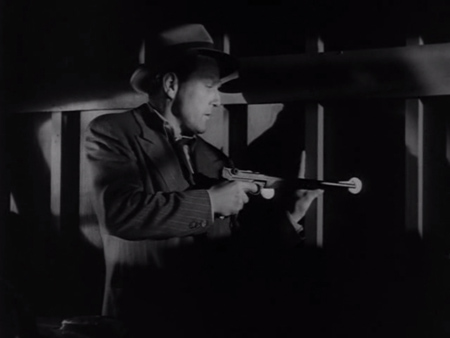Charles McGraw is escaped convict Arnold 'Red' Kluger, who has 2 things on his mind: get his hands on the money from the last robbery he did and get even with the people he holds responsible for him doing time in Folsom. To that end he kidnaps police detective Ray Williams (Michael O'Shea) and D.A. MacDonald (Frank Conroy), who captured him and sent him to prison, and his former gunmoll Carol (Virginia Grey) whom he suspects ratted him out to the police. Together with fellow escapees Nick Damon (Anthony Caruso) and Lefty (Frank Richards) they drive to an abandoned shack in the desert with innocent truck driver Joe (Don McGuire) and his moving truck. There they wait for Kluger's partner to take him to Mexico and his money. Meanwhile the manhunt for Kluger is led by inspector Murphy (Robert Shayne), who believes Williams went undercover to find Kluger..
I'm headed for that gas chamber anyway, you two won't even count.While not top-billed, and not yet a household name, the real star of the movie is without a doubt Charles McGraw. After a string of smaller parts, including a memorable part as one of the eponymous killers in 1946's 'The Killers', this movie proved to be his break-out role. It landed him a long-term contract at RKO where his next movie would be another great noir, 1950's 'Armed Car Robbery' (guess what that one's about...). As 'Red' Kluger, McGraw shows his intensity, charisma and screen presence. The man's chiseled face with his gruff voice were a perfect match for film noir. He also carries an impressive gun with an impossibly long barrel here, as can be seen in the poster as well as the screenshot below. Does anybody know the make and model of this gun? I'm curious...
As is often the case in a 'squeaky good guy versus vicious bad guy' movie, the bad guy is the one who's fascinating to watch. And McGraw, no matter what role he played, was fascinating to watch. One of noir's toughest tough guys. Director Felix Feist directed another genuine tough guy a few years earlier in another noir, Lawrence Tierney in 1947's 'The Devil Thumbs A Ride'. But while Tierney was probably the bigger (and definitely more notorious) tough guy in real life, McGraw was the better actor. And he's excellent here, elevating this movie to a higher level. He exudes menace and ruthlessness from every pore of his (in this movie extremely sweaty) body, whether it's by calmly threatening people or by getting truly violent. The few times McGraw gets violent, the camera focuses squarely on him, showing his pent-up intensity as he shoots somebody or, in the most violent scene, slams a wooden chair to bits and pieces over O'Shea whom he has pinned down on the floor.
Top-billed Michael O'Shea does a decent enough job, but to me he is not noir-material. He also appears in a few other (low budget) noirs, like 'Mr. District Attorney' (1947) and 'Parole, Inc.' (1948), but his face is far too friendly. Maybe the studios didn't know what to do with him, he never seemed to find his niche in Hollywood. But to be honest, O'Shea isn't an actor you watch a movie for, especially not something as dark as a film noir. To me he's miscast here, I cannot see how O'Shea could ever be a police detective, let alone an undercover one. Virginia Grey ('Highway 301', 'Strangers In The Night') on the other hand is great here as the gun moll. She is both desperate and seductive, and plays her part very effectively.
The movie plays out in 2 parts. The first part introduces the characters and is fast-paced. The second part starts when they get to the cabin and while the pace slows down, the tension only increases in the sweltering heat. Feist and Wild do a great job at balancing the movies parts together in a cohesive and natural manner, with a smooth but very tight flow. Also visually they keep a tight reign on things, with some excellent and clever shots, camera angles and shadows to keep things interesting.
The plot is pretty straight-forward but it does have some nice touches to it. At one point Williams, forced at gunpoint by Kruger, calls inspector Murphy over police radio to have them search in the wrong direction. He ends with a message for his wife and unborn son, using the one name he would only give his son with a gun to his back, hoping she'll catch it and inform the police. But she doesn't pick up on it until much later in the movie!
'The Threat' is a solid lean and mean slice of film noir with a lot of tension and hardly a wasted frame of film. It doesn't have a real femme fatale (altho Carol turns out to be a lethal lady), and the leading guy is nowhere near as cool as Sam Spade or Philip Marlowe. But it has Charles McGraw. And any crime movie with Charles McGraw is worth watching, take my word for it.
8/10
Fun piece of trivia: while O'Shea starred opposite McGraw in this movie which jumpstarted McGraw's career, O'Shea's wife Virginia Mayo starred opposite another silver screen tough guy, James Cagney, in 'White Heat' (also 1949) which reinvigorated his career after abandoning his gangster movies from the late 30s.











